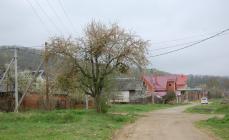Not far from the New Hebrides and New Caledonia is a piece of land surrounded on all sides by water Pacific Ocean. Its area is only twelve hectares, and the name is Matyu. Despite its small size, the island is marked on all maps of the southern seas. This is not surprising: on the boundless surface of the ocean, usually any piece of land is marked. Another thing is surprising: in different atlases, the country the owner of the island is designated differently. On English-language maps, the island is listed as France, on French for England, on the rest as it should. Deserted and inaccessible, the island of Mathieu, apparently, during the fever of colonial conquests was of no interest to anyone. And they just passed by. For a long time no one noticed the cartographic discord.
Two people were the first to notice this fact: Australian Bob Pole and Frenchman Henri Martinet. People energetic and not burdened by any permanent occupation, they decided to take control of the island into their own hands. Martinet had a sports plane, Pole owned a small schooner. Thus, the future island state had air and sea forces. Subsequently, it was supposed to join the UN. But first of all it was necessary to get to the island. What exactly the founding fathers were going to do on the island of Mathieu remained a mystery, because it soon became clear that they were sharing the skin of an unkilled bear.
To give legitimacy to the action, Pole and Martinet informed the co-rulers of the then Anglo-French condominium of the New Hebrides, each to their own, of their intentions. The co-rulers heard for the first time that Matthew had no owner. Until now, both believed that the island had an owner.
My friend, said the British representative of Poulou, cut these jokes. Everyone knows that the island is ours.
And as proof, he pulled out a French map.
Pole responded by presenting a map of the British Admiralty. A similar scene played out in the French mission with Martinet.
The co-rulers did not know what to do: the annals of colonial history did not keep such an event. Attempts to convince the companions to abandon the adventure failed. And although the authorities of the condominium of affairs were up to their necksThe New Hebrides were soon to gain independence, they decided to send a warship to the shores of Mathieu. It seemed that the turbulent times of the division of the world came to life for a while, when everyone tried by force to seize everything that was lying badly before their neighbor.
The British did not have a ship at their disposal, but the French had a cruiser. He was sent to the island of Tanna. There he took on board a police commissioner to repulse amateur attempts to found a state.
But, as luck would have it, Mathieu Island fell into the cyclone area, the force of the wind did not allow the cruiser to land on the shore. Disembarkation of the squad marines and the hoisting of the flag had to be cancelled. The only consolation was that other contenders could not get to the island. The cruiser returned to the port of Noumea in New Caledonia, and the commissioner flew home on the first plane to Tanna. Little by little the whole story was forgotten.
Henri Martinet, who had had enough of the worries of founding a state, was hired by a trading company as an air taxi pilot. But Bob Pole continued his activities, although the British representative relentlessly dissuaded him. Conferences between the British and French on the issue of the island continued. Mutual trips and intrigues too.
Pole's stubbornness aroused the suspicions of the authorities: why was he so stubborn? Since his adventurous tendencies and unstoppable desire to make big money were well known, the co-rulers became convinced that he was working for someone behind his back. Evidence of this could not be found, but still no one believed that he just started all this fuss. In addition, it was expensive to maintain a schooner, which now does not carry out any trading orders. Obviously, someone paid for the cost of sailing back and forth to the shores of Matyu.
Prudent officials on both sides decided at all costs to get ahead of Bob Pole. But at the same time, above all, they tried to interfere with each other. The French began to prepare the cruiser again. The British side, having learned about this, protested, arguing that they were the first to notice the ownerlessness of Mathieu Island. That's why the island is theirs. The cruiser had to stay in Noumea.
However, the French representative managed to win Henri Martinet over to his side. To this end, he was lured away from the trading company and agreed that he would land from the air on a disputed piece of land. At the airport he was escorted by a special commission. Henri took the French flag with him.
Unfortunately, no one including Martinet really knows the coast of the island. Therefore, he landed on a very unfortunate place. The undercarriage burrowed into the sand, the plane turned over several times and broke in half. Henri Martinet himself survived.
When the traveler did not return at the appointed time, a rescue expedition was organized. Tired and scratched, Henri was taken to Noumea. In order to avoid the intrigues of the insidious Albion, they tried not to mention the purpose of his flight either in newspapers or on the radio.
And soon Henri again already on a state-owned plane with a mechanic headed for the inhospitable shores of Mathieu Island. It was supposed to land on the island, hoisting the tricolor French flag, repair the first aircraft and return to Noumea with two planes.
It’s as if someone has bewitched Mathieu Island, which no one needs so far! It was worth trying to step on him with his foot, as if the elements were breaking loose from the chain. This time, the hurricane tossed the plane, and both members of the expedition were at sea. Both were saved by a passing yacht.
Henri Martinet had to come to terms with the loss of his air taxi. Yes, and Bob Pole left his claims to the inaccessible Matthew, or his unknown employers were disappointed in the undertaking.
That would have been the end of it, but the captains of the ships passing by the island paid attention to the wreckage of the aircraft sticking out of the sand on the shore, and each time they reported by radio to the nearest authorities that someone had obviously crashed on Matya.
The British demanded that the French clear the beach. There was nothing left but to send the same cruiser from Noumea again. The Gordian knot was cut with ancient simplicity: a volley of three side guns blew the wreckage to dust.
England and France have lost interest in the island: there are no people there, minerals, apparently, too. In 1980 Anglo-French rule in the New Hebrides ended. But to surrender the island of Mathieu to the government of the Republic of Vanuatu, proclaimed in the New Hebrides, turned out to be impossible.
It did not belong to anyone, no one could transfer it to anyone.
There are places on our planet that do not belong to any state. These territories are simply not needed, or are disputed by neighboring countries. There is such a land in Africa, and Suyash Dixit, a resident of India, tried to “capture” it.
Now "King" Dixit owns a plot of 2060 square kilometers called Bir Tawil. From the north, his kingdom borders on Egypt, and on all other sides - on the Sudan. These countries have abandoned this territory.
The “King” justified the right to own this territory: in order to become the full owner of a particular piece of land, it is necessary to grow a crop on it. Therefore, Suyash Dixit planted the first seeds here, documented this great historical event for Bir Tawil and promised to “work for the good of the country, people and land” until the end of his days. As for the leadership of the kingdom, he appointed his father as president, and another relative as prime minister and head of the military ministry. Dixit also invites everyone to become citizens of the new state and is looking for investors for its development.



By the way, the name of Bir Tawil is historical: that was the name of the water source in this area, which disappeared long ago.
By the way, this is not the first case of a self-proclaimed state. So, between Croatia and Serbia in 2015, the free republic of Liberland was formed, which was disputed by both countries. Another example is the Principality of Sealand. It was created in 1967 in the North Sea off the coast of Great Britain.
A stateless person is not uncommon nowadays. The number of such people, according to statistics, is currently about 15 million. In terms of population, this is the population of a country. Therefore, questions arise about this status: are there advantages for stateless people, in what cases can citizenship be obtained, etc. It is worth noting that a stateless person is endowed with all social rights, but is deprived of the privileges of a citizen of the state.
What does this mean?
Each person must belong to any country, be a citizen. However, there are exceptions. According to the citizenship law Russian Federation, a stateless person is a person who does not have the citizenship of any state, and does not documentarily belong to any country. Now there are quite a lot of such people in the world, and this issue is often discussed. Heads of state are trying to solve this problem, but not everything is so simple.
There is also the concept of bipatride. This is a person who has citizenship in two countries at the same time.
Advantages and Disadvantages of a Stateless Person
It would seem, about what advantages in question, after all, only disadvantages come to mind. A stateless person cannot officially get a job, he does not have the possibility of treatment in state institutions, education in higher educational institutions. In addition, stateless persons cannot freely travel around the world. People who do not documentedly belong to any state cannot be considered foreigners and enjoy their privileges. Stateless people do not have the rights that citizens of the country have. 
However, there is an advantage: this status makes it easier to obtain citizenship. In a number of countries, a stateless person can easily become a citizen if he has grounds for this. For example, in China, which is very demanding on people trying to obtain their citizenship, it is much easier for stateless people to become citizens of the country. People who do not belong to any state may not have to go through lengthy and expensive procedures for relinquishing their first citizenship in order to obtain a second one.
Circumstances under which you can become stateless
A person may not receive citizenship at birth, or may lose it at a conscious age. Moreover, this procedure is carried out both against the will and voluntarily.
Therefore, it is necessary to consider the main circumstances that may affect statelessness:
- If the child was born from parents who do not belong to any state (except in cases where the law of the soil is in force in the country).
- If a stateless person voluntarily renounced it. In this case, the passport and birth certificate are confiscated. This usually happens if a person wishes to become a citizen of another country.
- Deprivation of citizenship due to the fact that a person poses a threat to national security.
- If the state itself has disappeared. An example is the USSR, after the collapse of which all countries hastened to issue all regulatory documents in order to provide their citizens with passports.
Rights of people who do not belong to any country
Foreign persons and stateless persons are two completely different concepts that should not be confused. A person who does not belong to the state is usually not greatly infringed on his rights, with the exception of the restriction of some opportunities: to take part in elections, hold public office and serve in the army.

According to the law on citizenship of the Russian Federation, stateless persons can use free medical services on the territory of the country and cross the border for a certain period. In our country, the attitude towards stateless people is quite loyal, unlike other states. It is worth noting that if a stateless person has a diploma of education in a rare specialty, this gives him an advantage over a resident who will not have this document.
Stateless persons cannot participate in political parties and associations. Sometimes local authorities restrict their freedom of movement around the country.
How is the identity of a stateless person verified?
Let's consider this situation on the example of our country. The status of a stateless person does not allow obtaining an identity document - a passport. How to be? There is a list of official papers that can help in this case. The following documents may serve as an accreditation document:
- passport of another country (if any);
- permission for temporary stay in the country;
- resident card;
- other official papers that are recognized by the legislation of the Russian Federation.
Types of citizenship
Currently, it is customary to divide citizenship into 4 varieties, each of which has its own significant differences. Knowing the differences, a person can understand for himself what kind of citizenship he has, what he wants to receive.

So, the types of citizenship:
- Internal. The most common type means citizenship of the country in which the person lives. He can enjoy all the privileges in the territory of the state.
- Other. In other words, foreigners who live in the country, but have not yet had time to get a local passport. They can both legally stay in the country and illegally.
- Double. The case when a person is a citizen of two states at the same time. An amicable agreement must be concluded between them that foreign citizenship is recognized in order to enjoy all the privileges.
- No affiliation to any country.
Identification in the Russian Federation
What should a stateless person do? There are several stages that it must go through before full legalization. The first step is documentary identification. To pass this stage, a person must submit an application in the prescribed form to the Main Department of Internal Affairs of the Ministry of Internal Affairs, in which it is necessary to indicate personal data and the purpose of coming to the country.

In addition to this official paper, if possible, attach:
- pensioner's ID;
- driver license;
- invalid passport;
- Marriage certificate;
- registration certificate;
- receipt of payment of state duty.
Do not be surprised if the Ministry of Internal Affairs asks Additional information. It is recommended to submit documents with two acquaintances who are citizens of Russia and can confirm all the testimony.
Within three months, if all the documents are in order, the Ministry of Internal Affairs issues a special certificate with a photo - this will be a temporary identity card.
Temporary residence permit (TRP) and residence permit (permit)
Foreigners and stateless persons must obtain these two documents in order to reside in the country. Why is this needed? TRP and residence permit allows you to enjoy almost all the privileges: take out insurance, cross the border, etc.
In more detail, the temporary residence permit is a separate document. Each year, a quota is set, which controls the number of people who have received a permit. This means that there is a certain number of quotas, for example 130,000 pieces. Only those people who managed to get into this amount can receive a TRP. Moreover, the places are divided into foreigners and stateless persons.

This status makes it easier to obtain citizenship and temporary residence permits. However, there are several conditions:
- birth on the territory of the Russian Federation;
- spouse, spouse or child who are citizens of Russia;
- disabled parents with citizenship.
A residence permit provides even more benefits, but it is also much more difficult to obtain. Stateless people and foreigners strive to become the owner of this particular document, because thanks to it one can perform military service, freely cross the borders of the country, and work in law enforcement agencies.
How can a stateless person become a citizen of Russia?
According to the law, a person who has lived in the country for five or more years is entitled to receive the status of a citizen. There is a simplified procedure for native Russian speakers and people who were born and studied in the USSR.

The world community annually raises the issue of this problem and tries to provide normal living conditions for stateless people. However, a stateless person still does not have a number of rights and obligations. People who do not belong to the state should fight for their rights. In order for them to legalize their status and further improve the quality of life, all conditions have been created. To learn more about how to act in a particular situation, you need to contact lawyers personally or to representatives government agencies at the place of residence. You can get citizenship, you just need to correctly approach the solution of the issue.
In the jurisdiction there is the concept of territorial waters - this is the sovereign territory of the state.
The UN International Convention on the Law of the Sea defines a strip of coastal waters - the territorial sea of the state.
This is a 12 nautical miles (22.2 km; 13.8 mi) strip from the coastal state.
Land (islands, cliffs, reefs) in the territorial sea belongs to a particular state.
This sovereignty also extends to the airspace above the sea and to the seabed within the coastal strip. Boundary correction, in international law, is called maritime boundary delimitation.
Foreign ships (military and civilian) are allowed to pass through territorial waters in peacetime.
The term "territorial waters" is sometimes informally used to describe any area of water over which a state has jurisdiction, including internal waters, the contiguous zone, the exclusive economic zone, and the potential continental shelf.
But let it be known to you that there are lands and waters that do not belong to anyone - not to any state!
Such territories are referred to as "international waters" or "transboundary waters"
Oceans, seas, and large ecosystems - in cases where they go beyond international boundaries, are outside national jurisdiction.
To be on the high seas, which in Latin is called Liberum (free sea) - for ships, this means that they are under the jurisdiction of the state whose state flag flies over them (above the vessel), if any.

However, when a ship engages in piracy, any country may exercise jurisdiction over the pirates, in accordance with the doctrine of universal jurisdiction.
International waters can be compared to the territories of exclusive economic zones.
There are disputed lands and disputed international waters:
- Arctic Ocean. Canada, Denmark, Russia and Norway claim parts of the Arctic seas as national waters or inland waters. Most countries European Union and the countries of the United States, in opposition to these claims, officially treat the entire region as international waters.
- South ocean. Australia claims an exclusive economic zone (EEZ) around Antarctica and has its own Antarctic territorial claims. Because this claim is recognized by only four other countries, the EEZ claims remain controversial.
In addition to official disputes, the Somali government exercises de facto control over Somali territorial waters - piracy, illegal dumping and fishing without permission.
Water often becomes a source of conflict. Control water resources is a matter of cooperation between countries. Such cooperation will benefit the participating countries and become a catalyst for socio-economic development.
Antarctica (not to be confused with Atlantis) is a continent that does not belong to any state in the world. It was proclaimed the continent of peace and science. And all why?
Where is Antarctica
The fact that this is the coldest is not a secret even for a schoolboy. From curriculum It is also known in which hemisphere Antarctica is located. The equator divides our planet into two parts, and in its southern part is this majestic realm of ice.
Southern white land
It is unlike any other continent on our planet. Endless desert lands covered with a huge layer of ice, with raging winds and eternal snows. What hemisphere is Antarctica in? In the South. But for a person from the northern latitudes, the south is certainly associated with warmth and sun. Here it's the other way around. Interestingly, the sunrise in this part of the world can be seen only once a year. In summer, it constantly illuminates the desert glaciers, only along the edge inhabited by penguins, seals and birds that can survive in those conditions. AT winter months on the mainland comes the polar night, which lasts 176 days. Do not think that only the above animals live there, because there is even room for plants. Yes, mosses and lichens grow here, in total more than 380 species, some species of mushrooms. There are beetles and worms, crustaceans. Fish are found in the waters, which are the main food for penguins and seals. In general, for such harsh conditions, the fauna and flora are very diverse.

Antarctica is located at the south pole and, together with all the islands that are scattered around it up to 50 o -60 o south latitude, occupies the area called Antarctica. The prefix "anti" means "against", which means "against the Arctic". This name was given based on the hemisphere in which Antarctica is located relative to the previously named other cold part of the world located on Although long before Antarctica was discovered, mankind suspected that there was a mainland somewhere in the extreme south of the Earth. However, for some reason they hoped that there were huge deposits of gold there, even the name was given - the Unknown Southern Land. Already now, after hundreds of years of research, it is clear that there are no huge gold reserves there, except to consider a huge amount of gold fresh water frozen.
Russians and Antarctica
The hemisphere in which Antarctica is located played an important role in its study, especially by Russian scientists. Huge experience in work at the North Pole affected, and it was the Russians who first discovered the continent. It was the Russians who were able to build many research stations in a short time in the last century in harsh conditions. Even Orthodox Church Holy Trinity is. By the way, the first wedding was already held there between a Russian woman and a Chilean working together in these cold mysterious lands.
Many names of Russian explorers are immortalized in these lands, and a large number of places have Russian names.

So why doesn't Antarctica belong to any state?
This decision was made on December 1, 1959 due to how important this continent is for the planet. If suddenly all the ice that exists in this area melts, then life in other parts of the world will change dramatically. The sea level will rise by 60 meters, and this is fraught with the disappearance of many countries or their parts from the face of the Earth. So, the state of Florida, Venice, the countries of Denmark, the Baltic states will go under water. Crimea will become an island, much smaller than it is now, and Australia will become a sea altogether. What can we say about the climate, in the creation of which Antarctica plays a role commensurate with the Gulf Stream. Therefore, it is better not to violate the structure and integrity of the mainland.

The place where Antarctica is located is invaluable for scientific and research activities, including for the study of space and the influence of the Sun on our planet. Different states lead on the continent only scientific work and share their experiences with each other, as mandated by the 1991 Madrid Protocol. Where Antarctica is located, people do not live permanently. Scientists spend no more than a year in these places, and then they are replaced by others. And the fact that Antarctica is at the Pole should not be misleading: it is far from being a nice, warm southern country.






